Daily Vocabulary Words: List of Daily Used Words
Hi there. Welcome to this special section @ Wordpandit.
Our endeavour here is straightforward: highlighting important daily vocabulary words, you would encounter in The Hindu. This is your repository of commonly used words; essentially, we are posting a list of daily used words. Hence, this has significant practical application as it teaches you words that are commonly used in a leading publication such as The Hindu.
Visit the website daily to learn words from The Hindu.
WORD-1: Retrieval
CONTEXT: the State BJP, like other parties in Tamil Nadu, has been talking about the island’s retrieval, the situation gets complicated when its national leadership too lends its voice. A
SOURCE: The Hindu
EXPLANATORY PARAGRAPH: Retrieval is like finding something you lost or getting back information you stored, like when you search for your favorite toy or remember a story you read before.
MEANING: The act of getting something back or obtaining information from storage or memory (noun).
PRONUNCIATION: ri-TEE-vuhl
SYNONYMS: recovery, recovery, recall, recollection, reclamation
USAGE EXAMPLE:
1. The retrieval of the lost keys took some time but was successful.
2. Retrieval of data from the old system was a complex process.
3. The book’s index aids in the quick retrieval of information.
4. The retrieval of memories can be triggered by familiar sights or smells.
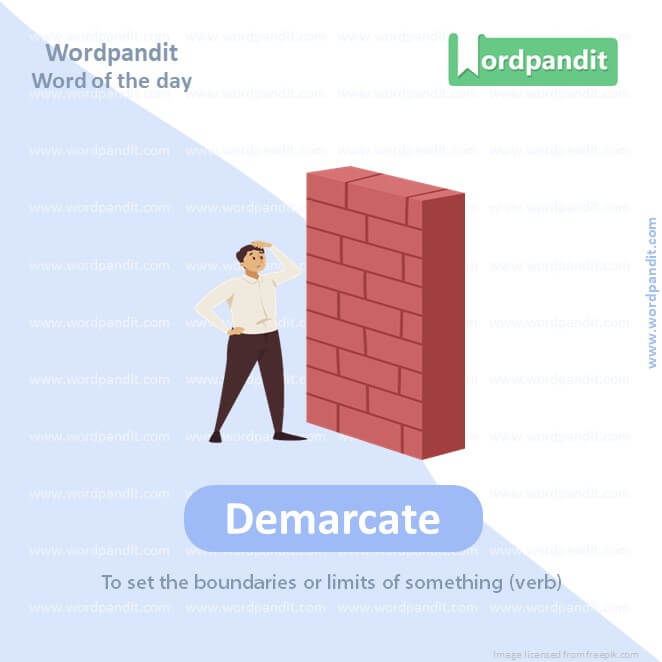
WORD-2: Demarcate
CONTEXT: These include the reference by an Indian survey team in 1874-76 to Kathatheevu being a part of Sri Lanka, Sri Lanka’s assertion of sovereignty since 1921 when talks began to demarcate the fishery line in the Palk Bay, and the inability of the Madras Presidency to establish the islet’s original title.
SOURCE: The Hindu
EXPLANATORY PARAGRAPH: Demarcate is like drawing a clear line or boundary to separate different areas, like when you use a ruler to mark where one color ends and another begins in your coloring book.
MEANING: To set the boundaries or limits of something (verb).
PRONUNCIATION: dih-MAR-kayt
SYNONYMS: delineate, delimit, define, mark off, separate
USAGE EXAMPLE:
1. The fence demarcates the property line between the two houses.
2. The treaty aimed to demarcate the borders between the two countries.
3. It’s important to demarcate personal and professional boundaries.
4. The signs demarcate the different sections of the park.
WORD-3: Merely
CONTEXT: This means that domestic manufacturers should be subject to stringent quality checks and not be allowed to compromise on cost and quality merely on nationalistic grounds.
SOURCE: The Hindu
EXPLANATORY PARAGRAPH: Merely is like saying “only” or “just,” indicating that something is simple or limited, like when you have only one cookie left and not more.
MEANING: Simply or only, used to emphasize the smallness or insignificance of something (adverb).
PRONUNCIATION: MEER-lee
SYNONYMS: simply, only, just, solely, purely
USAGE EXAMPLE:
1. It was merely a misunderstanding, nothing serious.
2. The task requires merely a few minutes to complete.
3. She was merely stating the facts, not offering an opinion.
4. The movie was not merely entertaining but also thought-provoking.
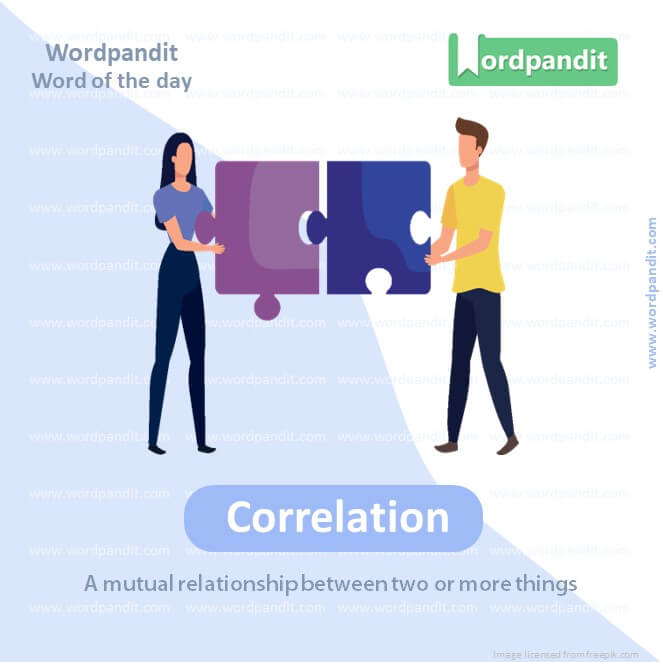
WORD-4: Correlation
CONTEXT: A paper in the Asian Journal of Political Science, in 2015, titled “India 2014: Facebook ‘Like’ as a Predictor of Election Outcomes” showed a high positive correlation between the number of ‘likes’ a party or its leader secured on their official Facebook fan page and their popular vote share.
SOURCE: The Hindu
EXPLANATORY PARAGRAPH: Correlation is like when two things are related or connected in some way, like when you notice that it rains more when there are dark clouds in the sky.
MEANING: A mutual relationship between two or more things.
PRONUNCIATION: kawr-uh-LEY-shuhn
SYNONYMS: connection, relationship, association, link, correspondence
USAGE EXAMPLE:
1. Studies show a correlation between exercise and improved health.
2. There’s a correlation between smoking and lung cancer.
3. The data analysis revealed a strong correlation between income and education level.
4. The correlation between temperature and ice cream sales is well-known.
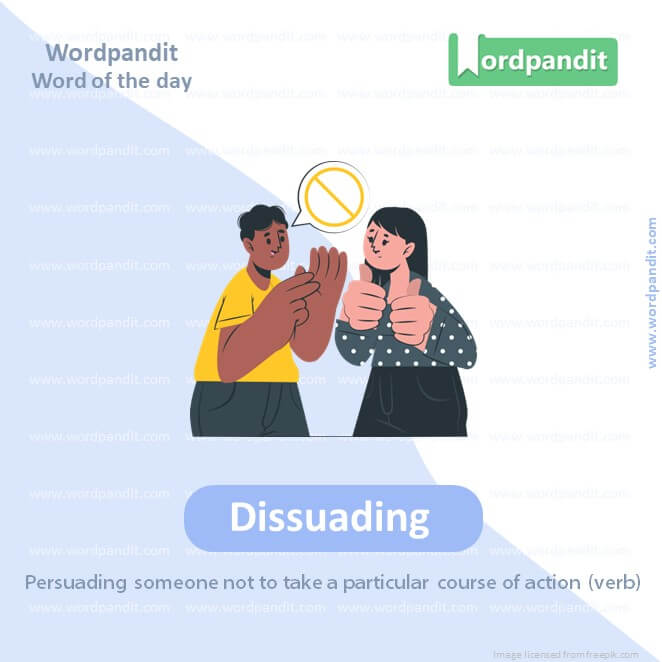
WORD-5: Dissuading
CONTEXT: it was a robocall made by AI aimed at dissuading Democratic voters not to turn up to polling stations on election day.
SOURCE: The Hindu
EXPLANATORY PARAGRAPH: Dissuading is like convincing someone not to do something, like when you try to talk your friend out of eating too much candy because it’s not good for them.
MEANING: Persuading someone not to take a particular course of action (verb)
PRONUNCIATION: dih-SWAY-ding
SYNONYMS: discouraging, deterring, dissuasion, advising against, talking out of
USAGE EXAMPLE:
1. The parents were dissuading their child from joining a dangerous adventure.
2. She tried dissuading him from taking the risky job offer.
3. The warnings from friends dissuaded her from investing in the scheme.
4. The teacher’s advice dissuaded students from cheating on the exam.
WORD-6: Outlawed
CONTEXT: The United States government has outlawed robocalls using AI-generated voices in its response to the Biden robocall incident.
SOURCE: The Hindu
EXPLANATORY PARAGRAPH: Outlawed is like when something is forbidden or not allowed by law, like when you’re not allowed to eat cookies before dinner because your parents said so.
MEANING: Prohibited or made illegal by law (adjective).
PRONUNCIATION: OUT-lawd
SYNONYMS: banned, prohibited, forbidden, illegal, unlawful
USAGE EXAMPLE:
1. The sale of ivory was outlawed to protect endangered species.
2. Smoking in public places was outlawed to promote public health.
3. The use of certain chemicals in cosmetics was outlawed due to safety concerns.
4. The government outlawed the use of plastic bags to reduce environmental pollution.
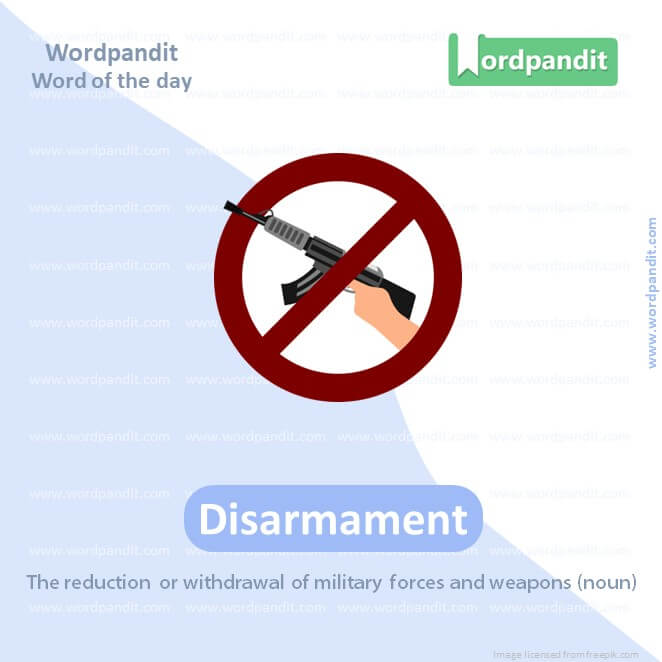
WORD-7: Disarmament
CONTEXT: Prime Minister Jawaharlal Nehru made a speech in the Lok Sabha that would put India on the global stage of nuclear disarmament.
SOURCE: The Hindu
EXPLANATORY PARAGRAPH: Disarmament is like removing weapons or reducing military strength, like when countries agree to stop making weapons to promote peace.
MEANING: The reduction or withdrawal of military forces and weapons (noun)
PRONUNCIATION: dis-AR-muh-muhnt
SYNONYMS: demilitarization, disarmament treaty, arms control, disarmament agreement
USAGE EXAMPLE:
1. The treaty aimed at global disarmament to prevent war.
2. Negotiations for disarmament were ongoing between the two countries.
3. Disarmament talks focused on reducing nuclear weapons.
4. The conference discussed strategies for achieving disarmament in the region.
WORD-8: Pragmatism
CONTEXT: This speech was marked by pragmatism, vision, and self-assurance.
SOURCE: The Hindu
EXPLANATORY PARAGRAPH: Pragmatism is like being practical and realistic in solving problems, like when you choose the fastest route to school because it’s efficient.
MEANING: A practical and realistic approach to solving problems or making decisions (noun).
PRONUNCIATION: PRA-gmuh-tiz-uhm
SYNONYMS: practicality, realism, practical approach, commonsense, rationality
USAGE EXAMPLE:
1. His pragmatism led to efficient solutions to complex problems.
2. Pragmatism is often favored in business decision-making.
3. The politician’s pragmatism appealed to voters seeking practical solutions.
4. Pragmatism requires flexibility and adaptability in changing circumstances.
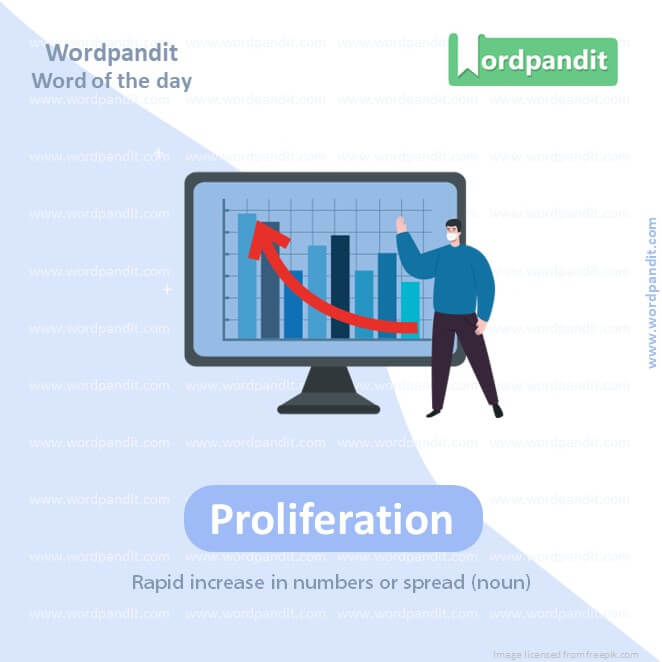
WORD-9: Proliferation
CONTEXT: he cemented India’s claim to leadership, gave impetus to calls that eventually yielded the Partial Test Ban Treaty (PTBT), and arguably limited horizontal nuclear proliferation by insisting on treating nuclear weapons as beyond the pale.
SOURCE: The Hindu
EXPLANATORY PARAGRAPH: Proliferation is like when something spreads rapidly or increases in number, like when plants grow quickly and cover a large area.
MEANING: Rapid increase in numbers or spread (noun)
PRONUNCIATION: proh-lif-uh-RAY-shuhn
SYNONYMS: growth, expansion, multiplication, increase, escalation
USAGE EXAMPLE:
1. The proliferation of social media platforms has changed communication.
2. The proliferation of smartphones has transformed how we access information.
3. Concerns were raised about the proliferation of nuclear weapons.
4. The rapid proliferation of technology has led to new challenges and opportunities.
WORD-10: Stockpiling
CONTEXT: the United Nations Disarmament Commission to address both the immediate moratorium and the longer-term goal of prohibiting the production and stockpiling of nuclear weapons; sought to build public pressure on nuclear states by calling for greater disclosure on the destructiveness and effects of these weapons;
SOURCE: The Hindu
EXPLANATORY PARAGRAPH: Stockpiling is like storing a large amount of something for future use, like when you keep extra snacks in your backpack for a long trip.
MEANING: Accumulating a large supply of something, especially for future use or emergencies (noun).
PRONUNCIATION: STOCK-pahy-ling
SYNONYMS: hoarding, accumulating, storing, amassing, collecting
USAGE EXAMPLE:
1. The government was stockpiling food and medical supplies for disaster relief.
2. Stockpiling weapons during times of peace can escalate tensions.
3. She started stockpiling books for her summer reading list.
4. Stockpiling resources can be a strategy for coping with shortages.
Vocabulary Words
When delving into the dynamic world of languages, the grandeur of ‘vocabulary words’ is all-encompassing. The importance of ‘vocabulary words’ in effective communication cannot be overstated; it’s these words that form the backdrop of any language, painting intricate pictures of thoughts and ideas.
Starting on the journey of learning ‘vocabulary words’, one should steer clear from rote memorization. The traditional structure of merely repeating words lacks the necessary context and application that actually embeds these words into your memory. To truly master the ‘vocabulary words’, one needs an integrated, immersive approach.
The first step towards mastering ‘vocabulary words’ is to engage with varied language mediums. Expanding beyond textbooks to read fiction, articles, blogs, and other forms of content not only diversifies your vocabulary but also acts as a mirror to reflect the practical application of these words. Essentially, you’re exposed to the words as they are commonly used, allowing you to truly understand their essence.
Empowering this journey, tech tools like language learning apps and memory-enhancing flashcards significantly aid in learning ‘vocabulary words’. These interactive tools provide a more engaging learning experience and hone word retention. Mnemonic devices, associating words with a unique story or visual image, enrich the process and make memory recall more efficient.
Practicing ‘vocabulary words’ by using them in day-to-day conversations exemplifies learning by doing. It also strengthens the neural pathways and improves overall word recall. This, coupled with regular revisions, ensures your grasp over ‘vocabulary words’ remains strong.
In conclusion, learning ‘vocabulary words’ is not just about adding words to your linguistic cupboard, but understanding their essence and utilizing them effectively. An inclusive approach to learning that combines diverse reading materials, technology tools, mnemonic devices and practice can really propel your mastery over ‘vocabulary words’. Remember, language is the bloodline of communication, and ‘vocabulary words’ are its heartbeat. ‘













